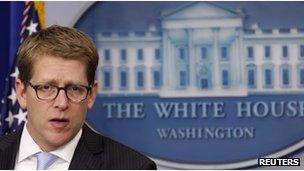White House: IAEA visit a 'failure' for Iran
- Published

The White House has said it is disappointed that UN nuclear inspectors were barred from a site in Iran, calling the visit a "failure" for Iran.
"It's another demonstration of Iran's refusal to abide by its international obligations," said White House spokesman Jay Carney.
IAEA inspectors had sought to clarify the "possible military dimensions" of Iran's nuclear programme.
Tehran insists its nuclear intentions are purely peaceful.
US state department spokesman Mark Toner told reporters that Tehran's move was "disappointing", but the country wanted to see negotiations move forward.
"There is that diplomatic track," Mr Toner said. "But we're not going to ease up on the sanctions."
In Tehran, Supreme Leader Ayatollah Ali Khamenei announced on Iranian state television that Iran's nuclear policies would not change in the face of international pressure.
"Pressures, sanctions and assassinations will bear no fruit," Mr Khamenei said. "No obstacles can stop Iran's nuclear work."
Inspectors from the International Atomic Energy Agency had hoped to inspect a site at Parchin.
The IAEA said that after two days of talks, its team was returning from Iran without a deal on a document "facilitating the clarification of unresolved issues".
The first round of discussions in January also failed to produce a result.
'Strong indications'
"It is disappointing that Iran did not accept our request to visit Parchin," IAEA Director General Yukiya Amano said in a statement. "We engaged in a constructive spirit, but no agreement was reached."
In November, an IAEA report - based on what it called "credible" information - indicated that Iran had built in 2000 a large explosives containment vessel at Parchin to conduct hydrodynamic experiments.
Hydrodynamic experiments, which involve high explosives in conjunction with nuclear material or nuclear material surrogates, were "strong indicators of possible weapon development", the report said.
In addition, the use of surrogate material and the confinement provided by a chamber could be used to prevent contamination of the site with nuclear material, the report added.
Iran's ambassador to the IAEA, Ali Asghar Soltanieh, said at the time that there were no nuclear-related activities at Parchin.
Israeli strike speculation
On Tuesday, Mr Soltanieh said Tehran expected to hold further talks with the IAEA. He was quoted by Iran's Isna news agency as saying the latest discussions had been intensive and that talks would continue.
The BBC's Bethany Bell, in Vienna, says the refusal to grant access to Parchin does not come as a major surprise, as there has been little progress in the negotiations between the two sides.
The inspectors' evaluation of their visits may form part of the next report on Iran's nuclear programme, expected later in February.
But last November, the IAEA said it had information suggesting Iran had carried out tests "relevant to the development of a nuclear explosive device".
This led to decisions by the US and the European Union to tighten sanctions against Tehran, including measures targeting the country's oil industry.
Tensions have risen further over speculation that Israel may carry out a military strike on Iran's nuclear facilities.